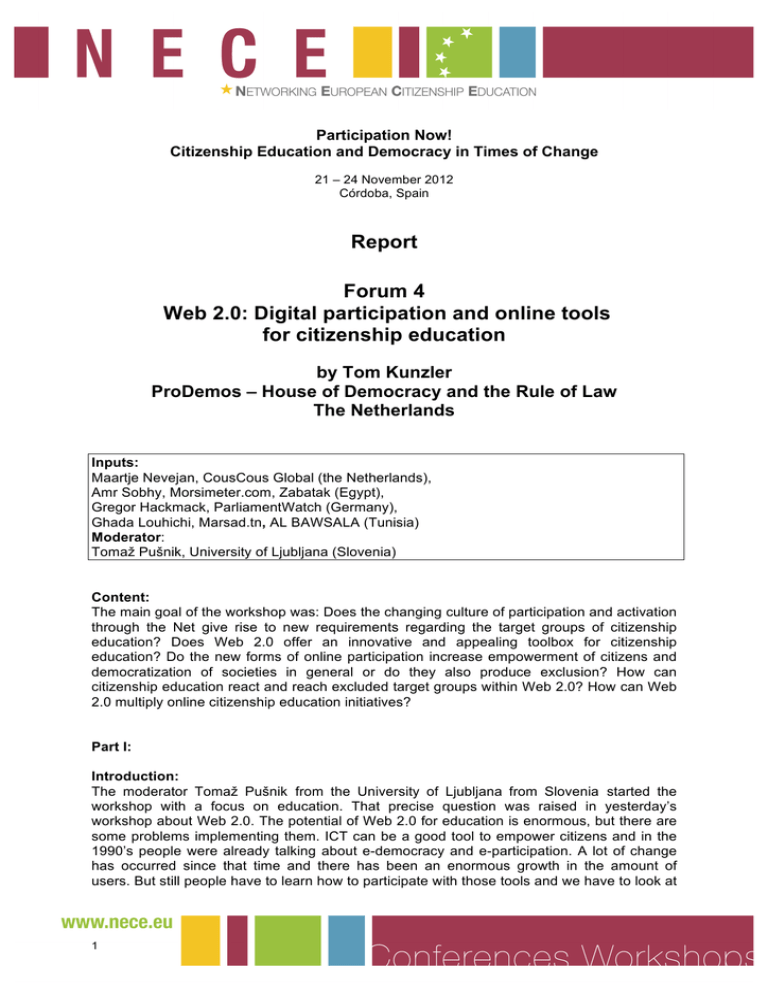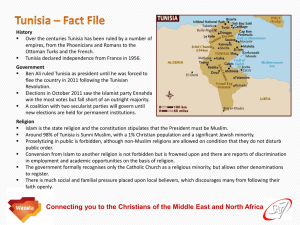Report Forum 4 Web 2.0: Digital participation and online tools
advertisement

Participation Now! Citizenship Education and Democracy in Times of Change 21 – 24 November 2012 Córdoba, Spain Report Forum 4 Web 2.0: Digital participation and online tools for citizenship education by Tom Kunzler ProDemos – House of Democracy and the Rule of Law The Netherlands Inputs: Maartje Nevejan, CousCous Global (the Netherlands), Amr Sobhy, Morsimeter.com, Zabatak (Egypt), Gregor Hackmack, ParliamentWatch (Germany), Ghada Louhichi, Marsad.tn, AL BAWSALA (Tunisia) Moderator: Tomaž Pušnik, University of Ljubljana (Slovenia) Content: The main goal of the workshop was: Does the changing culture of participation and activation through the Net give rise to new requirements regarding the target groups of citizenship education? Does Web 2.0 offer an innovative and appealing toolbox for citizenship education? Do the new forms of online participation increase empowerment of citizens and democratization of societies in general or do they also produce exclusion? How can citizenship education react and reach excluded target groups within Web 2.0? How can Web 2.0 multiply online citizenship education initiatives? Part I: Introduction: The moderator Tomaž Pušnik from the University of Ljubljana from Slovenia started the workshop with a focus on education. That precise question was raised in yesterday’s workshop about Web 2.0. The potential of Web 2.0 for education is enormous, but there are some problems implementing them. ICT can be a good tool to empower citizens and in the 1990’s people were already talking about e-democracy and e-participation. A lot of change has occurred since that time and there has been an enormous growth in the amount of users. But still people have to learn how to participate with those tools and we have to look at 1 new initiatives that have a bottom up approach instead of a top down approach. He also raised the question on which way everyone can participate with these tools, even the older generation that doesn’t use the Internet. Part II: The first project presenter was Maartje Nevejan from CousCous Global from the Netherlands. She is a documentary filmmaker from the Netherlands and the founder of CousCous Global. She started of in the Netherlands with a series called CousCous and Cola. She used to give lessons to immigrant kids in the Netherlands and she noticed that those kids were angry with the West for some reason. The city of Amsterdam then asked her to do something with those kids and she thought of a debating competition. Afterwards she got really interested in the aversion of these kids to the West and especially against the United States. So she flew with some of these immigrant kids to the USA to meet with American kids. She filmed the meetings between the kids and American kids. The kids used to mistrust the media because in the Netherlands, Moroccan kids are quite badly portrayed in Dutch media. The series were controversial in the Netherlands because the planning was to air them in the same week when Dutch filmmaker was murdered by an Islamic extremist. Eventually Maartje wanted to sell the series. In the UK and USA, it was too controversial but Al Jazeera was more than willing to air the series. Maartje received lots of reactions because of the series. An enormous amount of children from all over the globe also wanted to participate. And that was the reason she started the website CousCous Global (www.couscousglobal.com/) on which people could upload there own videos with controversial topics like religion, gays in Iran and Dutch problems with women wearing a headscarf. Everyone could respond to the videos, which were subtitled and edited, without moderation. So the website became a huge success to get cultures closer and it created mutual understanding. The site has had 1,5 million viewers but the organization stopped improving the website after a year. The website is however still up and running so people can still have a discussion and upload their own videos. Part III: The second presenter Amr Sobhy from Zabatak, a young Egyptian non-profit initiative, created the website Morsimeter.com. This is a tool that monitors the commitment of the Egyptian president. When the Iron Curtain fell there was no good tool to communicate with the people. During the Arab Spring Revolts there is. So he build a website that monitors the progress of the promises that Mursi made for the first 100 days of his term. It is Sobhy’s conviction that the government has to communicate with the citizen through technology. A government should also engage the citizen in the decision making process. Morsimeter.com was launched on the day Mursi got into office. They launched the website in the middle of the night but still the site crashed due to it’s popularity. There are four bars on the website on which the progress of the promises can be measured. The website is a sign of a big change in Egypt. Most people were indifferent when it concerned politics in Egypt but after the Arab Spring they got interested, because actual change was possible. The former government of Mubarak just wouldn’t listen, so there was no hope for any change. Now Morsimeter.com is a very popular website and people are actually participating. What Amr Sobhy found shocking is that the Presidents office is even calling him when they achieved a promise and it isn’t yet checked as ‘achieved’ on Morsimeter.com. A few years ago the police would have visited Amr Sobhy for such a website, but until now nothing happened and the government is actually cooperating with him. So according to Amr Sobhy, this is the big change in Egypt. The president is paying attention to fulfilling his promises because he 2 knows Morsimeter.com is checking him every step along the way. People who don’t feel a change, even though it has been implemented, can also respond on Morsimeter.com that it isn’t been carried out well enough. Part IV: The third speaker was Gregor Hackmack, founder of the German ParliamentWatch website (www.abgeordnetenwatch.de). The goal of the website is to make transparent how the German members of parliament are functioning. How do they vote in parliament, what do they earn, are they present in parliament during an important vote. But the most important function of the website is the possibility for the public to ask questions to the members of the parliament (MP’s). The MP’s were answering more than 90 percent of the questions that are being asked by German citizens. The website is moderated because they want to prevent that insults are being sent and then this will happen a lot the MP’s won’t take the time to answer the question anymore. ParliamentWatch now receives 2000 questions per month, and the website was responsible for a parliamentarian to resign because he was never in parliament. Also two MP’s weren’t put on the list again because they weren’t answering their questions on the website. In this way, ParliamentWatch is a good website for the public to come into contact with their MP’s. The people check the MP’s they should be representing and they try to do a better job because they know they are being watched. The website is also strongly dependent on the press who can publish an important story to a broader audience with the traditional media. The site of ‘Der Spiegel’ even has its own portal for ParliamentWatch. The website has more then 10,000 visitors per month and it is completely crowd funded through donations. The project has also been migrated to other countries like Tunisia, where the next presenter will talk about. Part V: The last presenter was Ghada Louhichi who works for the Tunisian version of ParliamentWatch: Marsad.tn. Tunisia is one of the countries of the Arab Spring; now they have a democratically elected parliament. Yet, in Tunisia just small amounts of people do have access to the Internet and transparency is something the Tunisian government has to work on. The National Assembly of Tunisia does not even have its own website where you see what the agenda of the parliament is or what the MP’s are voting. Due to the lack of transparency Marsad.tn had to work really hard. Currently, they visit the meetings of the National Assembly to record the voting behaviour of the MP’s. The team regularly checks the Twitter account of various MP’s, too, to check the dealings of the parliamentarians. The MP’s in Tunisia already know Ghada Louhichi and they try to do a better job because they know they are to be monitored by the website. Marsad.tn exposed that a member of parliament voted for three persons at the same time, so they contacted the traditional media to expose this scandal. This member would probably resign because of this and she told the press it was just an accident. In Tunisia the cooperation with the traditional media is even more important than in Germany because of the lack of Internet access for most Tunisians. Now, Marsad.tn is also working with questions for the MP’s. People can even send hand written letters to Marsad.tn order to the get a question proposed personally to the concerned MP, and hopefully receive an answer. The team has to ask it by telephone or in person because a lot of MP’s do not have an email address. This indeed shows the differences between the German and the Tunisian version of ParliamentWatch. 3 Discussion: Afterwards the discussion started. People were all really excited about the presentations and about the various initiatives to promote citizenship. A lively discussion started and there wasn’t even enough time to ask all the questions there were. There wasn’t a lot written down on the moderation cards. So the input from the moderation cards is implanted in the discussion as well. A big question was the access to information that is provided through Web 2.0 tools. Ghada Louhichi told the group that the primary reason for her still to use traditional media is to spread the news she got from the Tunisian National Assembly to the people who do not use the Internet. This refers not only to the older people but also to those who basically cannot afford an Internet connection. That is also the reason Gregor Hackmack from ParliamentWatch received the question about who is asking the questions on ParliamentWatch. He said that more men then women are participating on the website but all the 2000 questions per month cover all sorts of subjects. So he didn’t think that representation is the biggest issue of his website. Some of the participants raised the question how trustworthy the information of the Egyptian government can be regarded that is listed on MorsiMeter. Amr Sobhy said that they can never verify it for 100 percent but they use all forms of traditional media to check the information and people can also respond on the website when they don’t notice any change. Second Session: In the second round there was a big focus on ParliamentWatch from Germany and that it was currently visible how MP’s vote, even though most people think there is party discipline. A lot of things were already discussed in the first round though. But there also was a question about a less top-down or bottom-up approach. There were also some horizontal Web 2.0 approaches. Maartje Nevejan from CousCous Global from the Netherlands tried to use Facebook to have a discussion between different youngsters, but Facebook banned her page, because she would have been promoting hatred. However you could use Facebook and Twitter to promote your news that comes from your normal website. It increased the amount of visitors and you also have to stay in touch with traditional media to reach everyone in the nation. So the biggest learning point from the workshop was that there are a lot of good initiatives, which can be implemented in a lot of countries. To be able to represent the whole nation with Web 2.0 you have to stay in close contact with traditional media that can spread your message. 4




